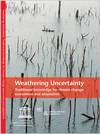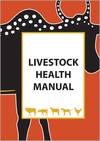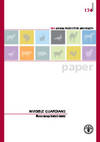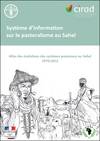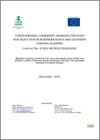When considering climate change, marginalized populations and pastoralists, warrant particular attention. Impacts on their territories and communities are anticipated to be both early and severe due to their location in vulnerable environments. Community-based and local knowledge may offer valuable insights into environmental change due to climate change, and complement broader-scale scientific research with local precision and nuance.
This report provides an overview of the published scientific literature (primarily peer-reviewed, but also grey) relating to the contribution of traditional/indigenous knowledge to our understanding of global climate change: observations, impacts, and opportunities for adaptation.
Year of publication: 2012Organization: Autores individuales
Topic: Cambio climático, El conocimiento indígena, Pueblos indígenas
Language: English
Type of document: Técnico
Geographical coverage: Global
Los países industrializados estamos afectando gravísimamente al medio ambiente de nuestro planeta, comprometiendo el futuro de toda la Humanidad. Es urgente reducir de inmediato nuestras emisiones de CO2 para que comiencen a decrecer antes de 2020, limitándolas a cero antes de 2050 respecto a los niveles de 1990. Para ello los países industrializados debemos modificar radicalmente nuestro modelo energético y nuestras pautas de consumo para intentar mitigar la crisis global que estamos provocando. Pero, junto a la reducción inmediata de las emisiones es necesario fomentar también los sumideros de carbono, que permitan retirar de la atmósfera el exceso de CO2 generado durante este último siglo.
Year of publication: 2012Organization:
Topic: Cambio climático, Seguridad alimentaria, Organización
Language: Español
Type of document: Boletines
Geographical coverage: Europa
An interdisciplinary team of researchers from the Health for Animals and Livelihood Improvement (HALI) Project collaborated with pastoralist communities living near the south-eastern border of Ruaha National Park in Tanzania to identify key diseases impacting livestock herd health. This information was then used to create this illustrated livestock health manual. This is particularly useful at the local level where it can be understood by most people in the communities where literacy rates may vary.
Year of publication: 2012Organization: Autores individuales
Topic: Economía, Seguridad alimentaria, Valeur ajoutée
Language: English
Type of document: Técnico
Geographical coverage: África Oriental
Water development enables the provision of a vital resource to sustain humans, animals and plants in Ethiopia’s arid areas. This report present an overview of water development in Ethiopia’s pastoral regions over the past 40 years.
Year of publication: 2012Organization: Instituto de Desarrollo de Ultramar
Topic: Seguridad alimentaria, Tierra, Servicios sociales
Language: English
Type of document: Técnico
Geographical coverage: África Oriental
This publication presents an analysis of women’s role in the sustainable use, development and conservation of animal genetic resources. The importance of small-scale famers and pastoralists as custodians of these resources is well recognized, but has never previously been disaggregated by gender. The differential roles of men and women have largely been neglected in studies of animal genetic resources management, but by piecing together several strands of argument and indirect evidence it can be concluded that women are the main guardians of livestock diversity.
Global trends in the livestock sector – particularly the shift from subsistence-oriented to market-oriented production, the sedentarization and disintegration of pastoralism, and the emergence of demand for niche market products – are analysed from the perspective of their influence on gender roles in livestock keeping and animal genetic resources management. Likewise, women’s role in the reproductive economy is analysed from the perspective of how this influences the type of livestock they keep.
Case studies from many regions of the world illustrate that while to a degree women acquire their role as guardians of diversity by default because of global trends, many also make an active and conscious contribution to the management of animal genetic resources.
Year of publication: 2012Organization: Organización de las Naciones Unidas para la Alimentación y la Agricultura (FAO)
Topic: Servicios ambientales, Género y juventud
Language: English
Type of document: Técnico
Geographical coverage: Global
Over the last 30 years, Sahelian pastoral livestock farming has undergone major institutional, socioeconomic, climatic and agroecological changes, which have had a profound impact on the lifestyle of increasingly vulnerable rural people. For this atlas, SIPSA and partners collected and analysed information products which confirmed these trends, but also revealed the scarcity of historical data and specific indicators required to refine the analyses and characterize, foresee and manage pastoral crises. An analysis of the 1972/202 period highlighted the overall trends.
Year of publication: 2012Organization: Organización de las Naciones Unidas para la Alimentación y la Agricultura (FAO), Centro de Cooperación Internacional en Investigación Agrícola para el Desarroll (CIRAD)
Topic: Economía, Servicios ambientales, Seguridad alimentaria
Language: English, Français
Type of document: Técnico, Mapas
Geographical coverage: África Occidental, África Central
Mongolia’s reindeer herders and their taiga homeland are today facing unprecedented challenges from unregulated mining, forest logging, loss of access to natural resources, tourism, and climate change. There is an urgent need to ensure that conditions are in place to maintain reindeer husbandry as a resilient and sustainable livelihood.
Year of publication: 2012Organization: Programa de las Naciones Unidas para el Medio Ambiente (UNEP)
Topic: Economía, Servicios ambientales, Pueblos indígenas
Language: English
Type of document: Técnico
Geographical coverage: Asia Central
This study report aims to map the grazing corridors for the Garre and Degodia clans in Wajir and Mandera Counties in Northern Kenya and Moyale, Dolo Ado, Filtu and Hudet Woredas in Southern Ethiopia, as part of the mechanism of minimizing drought risks. It presents the major problems associated with drought risk reduction strategies in the project area. The report calls for a more pro-active approach in addressing disaster risk reduction issues for the arid land inhabitants in the Horn of Africa.
Year of publication: 2011Organization: Autores individuales
Topic: Cambio climático, Resiliencia
Language: English
Type of document: Técnico, Mapas
Geographical coverage: África Oriental


